If you’re the type who believes that winning is everything, please proceed to the next article. Similarly, if you’re looking for some magical insight as to how the fortunes of our pro football team are about to turn around, keep scrolling. If, on the other hand, you’re open to thinking about the Detroit Lions more philosophically than your typical jersey-and-Zubaz-clad football fan, then maybe I have something you can nibble on.
The case for loving the sport is not hard to make. To quote Ted Lasso’s Dani Rojas, “football is life.” Sure, he was referring to fútbol, and his allusion to “life” meant that the beautiful game happily consumes his every waking minute. Nevertheless, I’ll co-opt his mantra and re-phrase it — “[American] football is like life.” That is, the sport provides a number of metaphors for life, tidy bits of wisdom applicable beyond Sunday afternoons.
Football is complex and unpredictable. It embodies the clash between conditions you don’t control and reactions to those conditions, which you do control. It requires unyielding cooperation, but also demands individual effort that, at times, can be isolating and, at others, heroic.
Most of all, football creates community. Where else can 60,000 people from every rung on the economic ladder and every branch of the cultural tree get behind something — these days, anything — for an extended period of time, sharing excitement and anticipation, sorrow and joy? That’s what a city’s football team provides.
But what about this team?
Its tradition of losing runs deep. During their decades of ineptitude, the Lions have invented new and innovative ways to lose. The “Calvin Johnson Rule”; the “Phantom Facemask + Improbable Hail Mary”; “Taking the Wind”; the “Pass Interference Flag Pickup”; the “Ten Second Runoff”; and most recently “Death by Field Goal,” Parts I and II. I could go on.
Of course the acute pain of any vexing, heartbreaking individual loss does not begin to approach the chronic agony borne of the sheer accumulation of defeat over the years, with precious little winning to offset the dejection. Since its last championship in 1957, the team has a record of 398-543. In that same era, the Bears are just .500, but they chalked up a Super Bowl and novelty rap song along the way.
And consider the real human toll. The in-game injury permanently paralyzing top offensive lineman Mike Utley, followed by the off-season death of a second star offensive lineman. Erik Andolsek, hit by a semi-truck while retrieving his mail. Yet another near-paralyzing neck injury to first-round pick Reggie Brown — visions of Johnnie Morton sprinting across the Silverdome turf clutching a defibrillator needed to revive Brown on the field spring to mind. I won’t even get into Chuck Hughes. You can look that one up.
So why, then? Why invest — time and money, energy and emotion — in supporting a team that perennially rewards its fans with relentless losing and literal tragedy?
I still love the Detroit Lions for the reasons I’ve always loved the Detroit Lions: They’ve taught my dad and me important life lessons; and now they teach my sons those same lessons.
The official register of sports cliches includes the old favorite, “I don’t care how often my team gets knocked down, I care how many times we get back up.” The expression usually comes from some thick-necked, still-sweating coach or player looking out-of-place behind the podium of a post-game presser. Turns out, however, this particular sports cliche borrows from Jewish wisdom. Proverbs advises,
For though the righteous fall seven times, they rise again, but the wicked stumble when calamity strikes.
In other words: Resilience, perseverance and resolve are important virtues. The statement doesn’t tell us whether these virtues are the cause or the effect of righteousness. I believe that resilience, perseverance and resolve need to be actively cultivated. We become better people when we learn to stick with the things and people we care about through difficult times (say, a pandemic). While there are many ways to cultivate resilience, perseverance and resolve, I’ll take the one that also involves bonding around goofy traditions and playful superstitions, quality time shared across generations and a lifetime of memories which, even when formed around heartbreak, all somehow imprint pure joy.
That’s what Lions football means to me.
So we — my dad, my sons, myself — still show up to every game. We cheer them on, we celebrate when they win, we lament each loss. We do not, however, burden ourselves with expectations. Because in the end, we’re investing in life lessons and priceless memories. No amount of blown calls or draft picks can keep the Detroit Lions from delivering on those, week in and week out.
Don’t get me wrong, though — next year will be the year.
Bashana haba’ah.

Comments
Sign in or become a Nu?Detroit member to join the conversation.
Just enter your email below to get a log in link.